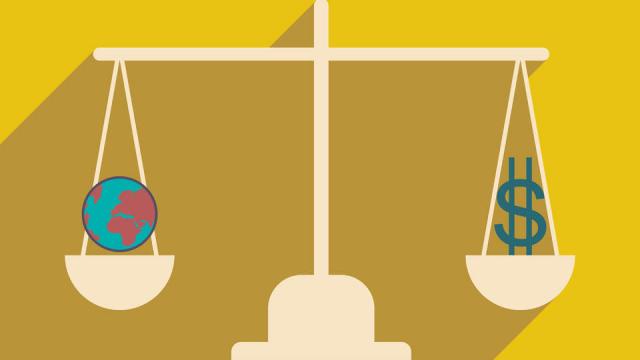
Part I in this series explored seven ways that climate change could trigger the next financial crash. Part II looked at the ways big finance and oil use self-reinforcing mechanisms of power to remain seated atop the capitalist system. In Part III we turn our attention toward a climate-aware economics that is already being built from the bottom up, in five primary ways.
“The recent financial crisis has demonstrated that the market is incapable of regulating the financial system, which is fragile and uncertain due to speculation and the emergence of intermediary brokers. Therefore, it would be totally irresponsible to leave in their hands the care and protection of human existence and of our Mother Earth.”
This extract from the People’s Agreement on Climate Change was co-written in Bolivia, in 2011, during a convergence of people representing indigenous nations. Following Donald Trump’s election, it appears even more obvious that politicians will not deliver either meaningful climate regulations or the necessary economic transformation to save our planet.
Fortunately, there are ways to build a climate-friendly economics from the bottom up.
1. Disconnect Society from Big Finance
Big Finance sucks the lifeblood out of the global commons, and depends heavily on oil that will have to go unburned to create a safe climate future. Society would be better off without this parasitic relationship to its banks, and there are ethical and pragmatic grounds for diminishing both the fossil fuel and financial sectors.
If oil companies bankrupt themselves repaying climate victims, or are forced to keep their assets in the ground due to direct action or regulation or both, this will be a universal win. Similar points can be applied across the global stock exchange; it would be great news, for instance, if the wealth generated by weapons companies went toward compensating victims of war. Or if bankers repaid the bailouts they received.
As things currently stand, a second financial collapse would create further human crisis on an enlarged scale. Main Street is tied to the financial industry, from pensions to local authority investments, and from public services assets to student, medical and household debt. This means the swelling divestment movement must accelerate to untangle our lives from toxic investments.
2. Rethink Banking
The banking services we need for our everyday lives could also be decoupled from the excesses of the financial sector. Recent regulation attempting to separate them has been too little and too weak. Building a new, climate-aware economy would enable us to let too-big-to-fail institutions collapse, which would have happened in 2008 without bailouts from the state. Adequately charging big banks for the crimes they commit is a good place to start.
A citizens network in Spain called 15MpaRato shows that bankers can be held responsible for fraud, as people organizing together are on course to send the country's top banker to jail. An important part of enabling society to withstand the next crisis is to support banks that aren't tied to fossil fuels and risky short-term investments. These already exist, like Amalgamated Bank in the U.S., the first on the continent to pledge to divest all its assets from fossil fuels. In the U.K., the group Move Your Money has created a resource of banks investing sustainably, in a campaign that could be rolled out on a global scale.
3. Redefine Investment
An ecologically sound future needs investment. But we should not call anything that sponsors the planet’s destruction "investment," like food speculation and derivatives. Undermining the financial industry and banks – through public legal actions, divestment and moving your money – enables this change. So does real regulation. But there are further people-driven means to rethink investment.
The progressive think-tank Common Weal advocates a National Investment Bank for an independent Scotland, based on the best practices of sovereign wealth funds. These funds provide money for long-term investment in projects that are both socially valuable and environmentally sound. A key area highlighted by Common Weal is its support for cooperatives and social enterprises. Bringing democratic ideals into the workplace by expanding the cooperative sector is also a strong way to rebalance the economy, by redistributing wealth and power.
4. Green Diversification and Decarbonizing
Many economies in the world suffer from lack of diversification, whether they're countries of the Global South that rely on primary production and cheap labour, or so-called developed countries where any real production is suffocated by a bloated financial sector fueling housing markets and other asset inflation. The failure to diversify makes economies stagnant and vulnerable, amplifying inequality and the 1%’s power.
The People’s Agreement asserts that countries need to become self-sufficient. It also stresses why we need to address overconsumption: “If this pace of over-exploitation of our Mother Earth continues, we will need two planets by 2030.” Focusing on over-exploitation, the military industrial complex is among the worst industry for people and planet. It has long been recognized that these industries’ skills and infrastructure could be transitioned into renewables, a sector that could create millions of stable long term jobs.
Creating sustainable transport and re-outfitting homes with energy efficient technology are among ways to reduce fossil fuel consumption. The food industry, too, needs an overhaul; it relies on deforestation, long distance transport, pesticides, fertilizers and other carbon-intense inputs. The eco-alternatives include organic, permaculture, buying local and eating less meat.
Moving society away from carbon dependence is not just about becoming good consumers, but engaged citizens. This includes positive individual and community action; standing up for the healthy, wholesome parts of the economy; backing them with positive investment; and taking all means necessary to prevent illegal wars and dirty energy extraction. The ongoing fight against free trade agreements also helps to ensure less dangerous extraction and over-consumption.
5. Rethinking Ownership Around Utility
One of the most incredible aspects of the current economic system is the way it – or rather, its economic spokespeople – claim to be efficient. All the homes kept empty by speculators, all the food thrown away by supermarkets: this isn't efficiency. Big corporations claiming to own the copyright on drugs that could otherwise save millions of lives, or seeds that were cultivated by indigenous farmers over millennia: this isn't efficiency, either. A key problem here is the economic principle that you can own something, even without utilizing it. Squatting empty buildings, or making local laws that buildings cannot be left empty, is one way to challenge this premise.
These are only some of the suggestions for alternatives. What is clear is that there are multiple existing paths to creating an economy that isn't dominated by the interests of the financial and fossil fuel sectors. The question is not whether a climate- and people-friendly future is possible. The question is: how to achieve the mass engagement that takes back power from the 1%?
3 WAYS TO SHOW YOUR SUPPORT
- Log in to post comments














